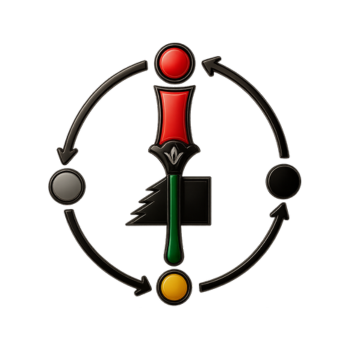-
In brief “Kawaida” is a Swahili word that means “tradition” but the term has come to mean a synthesis of tradition and reason informed by and developed in practice. Kawaida is a cultural and a social change philosophy that has as it’s central aims developing a logic and language of liberation that is constantly linking theory and practice, empowering people to change the quality and conditions of their lives and making a contribution to the creation of a just and good society and a good and sustainable world.
In order to construct this system Maulana Karenga had studied, borrowed from and then built on a wide range of continental and diasporic Afrikan thinkers which included Julius Nyerere, Sekou Toure, Marcus Mosiah Garvey, Ida B Wells just to name a few as well as texts in the Husia and Odu Ifa in which their concepts he evolved, redeveloped and reshaped as essential elements.
For example for the economic discourse the central category in Kawaida is “Ujamaa” (cooperative economics), an Afrikan concept of shared work and wealth introduced by Julius Nyerere and which also is said to mean Afrikan socialism. The root of the word Ujamaa is “jamaa, meaning “family,” which suggests kinship as the basis of the production, distribution and consumption of goods.
In the Kawaida Afrikan framework, this kinship extends to nature and everything and everyone in it, and thus supports an economic ethic that demonstrates a profound respect for the integrity and value of the environment and approaches the world as a shared heritage not to be monopolised or privatised by a few. Thus, it also resists economic and other practices that promote the plunder, pollution and depletion of the earth.
Moreover, Ujamaa as the principle and practice of shared work and wealth seeks to encourage a just and equitable distribution of resources of the world to enable everyone to live a life of dignity and decency. It also supports the rights and interests of workers, care for the vulnerable and the historical and ongoing effort to aid the poor in their struggle to end poverty and live full and meaningful lives.
2 Comments-
Beautiful ideology
-
Brothers and Sisters can read more information from the book I have titled “Encyclopedia of Black Studies” by editors Molefi Asante and Ama Mazama, pages 290 – 295. Regarding to the picture I got this diagram from one of my brothers who forwarded it to me a few months ago. He is involved in quite a few organisations and always gives me material of interest. I used this diagram as I felt this gave a much greater perspective of what Ujamaa is all about.
-

